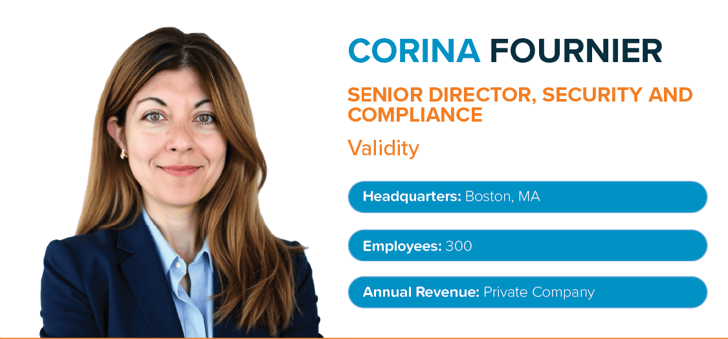
Corina’s career in cybersecurity began long before the industry was a formal discipline. Growing up in Europe, she attended a science and IT focused high school where she built computers, designed websites, and watched friends drift toward the black-hat world. Determined to be on the right side of the law, she set her sights on preventing cybercrime. Moving to the United States at 18, she initially studied biochemistry before ultimately following her passion for technology and earning her degree in IT with a focus on security certifications.
Her early career followed the traditional IT path, from help desk to network and systems engineering, but the pivot to security happened quickly. While working at a financial institution, she was tasked with reviewing 10,000 pages of SIEM logs, a process she instantly knew needed to be automated. From there she dove deeper into security operations, disaster recovery, encryption, and compliance, building an impressive foundation in financial services at a time when few organizations prioritized cybersecurity at scale.
Building Programs Across Industries
After a decade in financial services, Corina moved into healthcare, where protecting sensitive patient data introduced a new set of challenges. There, she gained valuable experience implementing compliance frameworks such as ISO 27001 and SOC 2, while also launching a security program for a software product that credentialed medical staff. This work sparked her interest in software companies and the cloud. She went on to build security programs from the ground up at multiple organizations, helping them achieve critical certifications, migrate securely to the cloud, and establish mature vulnerability management and risk frameworks.
Today, at Validity, Corina serves as Senior Director of Security and Compliance. Her responsibilities span customer trust, privacy and security compliance, vendor risk management, vulnerability management, and incident response. She leads a global team, including an in-house 24/7 SOC, and ensures alignment with frameworks. Her work balances the technical side of security with the governance and risk management needed to scale Validity’s operations amid growth and acquisitions.
Focus and Challenges
Looking ahead, Corina is concentrating on three priorities: enhancing incident response preparedness, strengthening cloud security and vendor risk management, and maturing vulnerability management. With cloud misconfigurations continuing to be a root cause of breaches across industries, she is laser-focused on ensuring Validity has both preventive and responsive controls in place.
The challenges are familiar: balancing speed of innovation with risk management, managing third-party risks without full visibility, and protecting a fast-moving business with a lean team. She emphasizes, “Security must be seen as a business enabler, not a blocker, even when decisions need to be made quickly with imperfect information.”
Leadership Style
Corina describes herself as a transformational leader. She looks for team members who are “smart, hungry, and humble” and builds her teams around trust and collaboration rather than competition. She believes the right mindset is just as important as technical skills. She empowers her team to innovate, maintains a culture of continuous improvement, and ensures work-life balance without sacrificing high standards. For her, leadership is about creating trusted partnerships across the business while pushing her team to do their best work.
Industry Perspective and AI Governance
With the rapid rise of AI, Corina has taken a proactive role in establishing Validity’s AI governance program. She works cross-functionally to ensure AI tools and data should be used responsibly. From vendor due diligence to internal policy, she has built a living framework that adapts as technology evolves. For Corina, the integration of AI represents both a risk and an opportunity, one that demands thoughtful governance to balance innovation with security.
Women in Cybersecurity
Having grown up in a culture where women in science and technology were common, Corina did not initially perceive gender as a barrier. She advanced quickly, landing IT management roles early on in her career. While she has occasionally encountered bias, she reframed those experiences as indicators of cultural misalignment rather than personal limitation. Today, she uses her platform to coach women entering the field, emphasizing grit, curiosity, and the ability to demonstrate initiative, whether through labs, certifications, writing, or community involvement.
Her advice for women early in their careers is straightforward, she says, “Show your grit and excitement. It’s not just about experience; companies look for passion and drive. I’ve seen junior hires with only one year of experience outpace peers with five years, simply because they were hungry to learn and succeed.”
Looking Forward
Corina thrives on the technical side of security as much as compliance and enjoys working with peers across business functions. She stays sharp by engaging in peer groups, conferences, hands-on labs, and ongoing training. For her, the future is about continuously improving programs, strengthening trust with customers, and shaping how security evolves alongside emerging technologies like AI.
She is particularly energized by the challenges AI introduces. “AI is here to stay, and security leaders can’t afford to ignore it,” she explains. “We need to embrace it responsibly, making sure we put guardrails around how data is used and ensuring our teams understand both the opportunities and the risks.” For Corina, this means helping organizations navigate a middle ground: not slowing innovation but ensuring that innovation is done safely and transparently.
Equally important for her is the human side of the equation. “At the end of the day, security isn’t just about tools and frameworks, it’s about people,” she says. “I want to keep creating environments where security teams feel empowered, where colleagues across departments know they can come to us with questions, and where customers feel they can trust us with their most sensitive data.” In her view, the next chapter of security leadership is not just about defending systems, but about building a culture of trust, resilience, and shared responsibility.